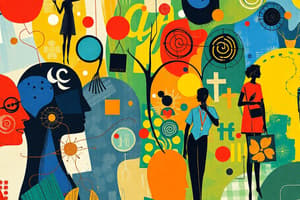Podcast
Questions and Answers
What is the primary focus of sociology?
What is the primary focus of sociology?
- The analysis of economic structures and their impacts
- The systematic study of human relationships and society (correct)
- The study of government systems and their functions
- Exploration of physical sciences and their effects on behavior
Which term best describes the compilation of ways humans interact with each other?
Which term best describes the compilation of ways humans interact with each other?
- Social Organization
- Social Service
- Social Structure
- Social Interaction (correct)
What defines a society in sociological terms?
What defines a society in sociological terms?
- An organization that fulfills human needs for belongingness (correct)
- A collection of individuals with random interactions
- A group of people living in isolation from one another
- A political body governed by strict laws
What do the roles in social organization prescribe?
What do the roles in social organization prescribe?
Which phrase best defines sovereignty in political science?
Which phrase best defines sovereignty in political science?
In the context of political science, which concept signifies a centralized governing body?
In the context of political science, which concept signifies a centralized governing body?
What is the primary feature of democracy?
What is the primary feature of democracy?
What does the term 'institution' refer to in sociology?
What does the term 'institution' refer to in sociology?
Which language roots do the terms 'political' and 'science' come from?
Which language roots do the terms 'political' and 'science' come from?
What characterizes an authoritarian government?
What characterizes an authoritarian government?
Which of the following is NOT considered a major political ideology?
Which of the following is NOT considered a major political ideology?
What does political culture encompass?
What does political culture encompass?
What role does civil society play in governance?
What role does civil society play in governance?
Which of the following accurately describes public policy?
Which of the following accurately describes public policy?
How does culture influence behavior in society?
How does culture influence behavior in society?
What does the study of politics help to understand?
What does the study of politics help to understand?
What does culture include according to the perspectives discussed?
What does culture include according to the perspectives discussed?
What is enculturation?
What is enculturation?
What is the primary question that anthropology seeks to answer?
What is the primary question that anthropology seeks to answer?
Which term describes the process wherein cultures adapt to incorporate desirable traits from other cultures?
Which term describes the process wherein cultures adapt to incorporate desirable traits from other cultures?
Which subdiscipline of anthropology focuses on language and culture?
Which subdiscipline of anthropology focuses on language and culture?
What does deculturation refer to?
What does deculturation refer to?
How does culture affect biology?
How does culture affect biology?
What does archaeology in anthropology primarily investigate?
What does archaeology in anthropology primarily investigate?
Which of the following best describes culture as it relates to society?
Which of the following best describes culture as it relates to society?
What aspect of human existence does physical anthropology study?
What aspect of human existence does physical anthropology study?
In which environment does an individual primarily learn their own culture?
In which environment does an individual primarily learn their own culture?
What does applied anthropology aim to achieve?
What does applied anthropology aim to achieve?
What is the etymological origin of the word sociology?
What is the etymological origin of the word sociology?
What does the term 'culture is adaptive' imply?
What does the term 'culture is adaptive' imply?
What is one of the primary focuses of cultural anthropology?
What is one of the primary focuses of cultural anthropology?
Which of the following best captures the goals of anthropology as described in the content?
Which of the following best captures the goals of anthropology as described in the content?
What are formal norms primarily concerned with?
What are formal norms primarily concerned with?
Which of the following best defines 'values' in the context of culture?
Which of the following best defines 'values' in the context of culture?
Which theoretical perspective emphasizes class conflicts as a driving force in societal development?
Which theoretical perspective emphasizes class conflicts as a driving force in societal development?
What term did Auguste Comte coin to describe the study of society?
What term did Auguste Comte coin to describe the study of society?
What is a major disadvantage of 'car culture' as mentioned?
What is a major disadvantage of 'car culture' as mentioned?
Symbolism in culture can be best described as:
Symbolism in culture can be best described as:
What differentiates folkways from mores?
What differentiates folkways from mores?
How does Herbert Spencer describe emerging societies?
How does Herbert Spencer describe emerging societies?
Flashcards are hidden until you start studying
Study Notes
Essentials in Studying Culture, Society, and Politics
- Anthropology focuses on understanding humans, derived from Greek 'antropos' (human) and 'logos' (study).
- Seeks to answer "What does it mean to be human?" encompassing biological and social aspects.
- Biologically examines genetic relationships, primate evolution, and social customs including rituals.
Five Subdisciplines of Anthropology
- Archaeology studies ancient human remains to understand adaptation and development.
- Cultural Anthropology explores a society's culture, beliefs, and practices.
- Linguistic Anthropology investigates language and its cultural significance.
- Physical Anthropology analyzes biological traits and variations in humans.
- Applied Anthropology uses anthropological theories to address contemporary issues.
Sociology
- Etymology combines Latin 'socius' (companion) and Greek 'logos' (study), focusing on societal relationships and human interactions.
- Addresses social issues influencing individual and group behavior.
Key Sociological Concepts
- Society: A product of human interaction and organization for belonging.
- Social Interaction: Methods through which humans connect.
- Social Organization: Interrelationship of societal parts defining accepted behaviors.
- Institutions: Established roles and groups like family and government.
Political Science
- Originates from Greek 'polis' (city-state) and Latin 'scire' (to know), focused on governance and political dynamics.
Key Political Science Concepts
- State: A sovereign political body with centralized governance.
- Sovereignty: The power of a state to govern itself independently.
- Democracy: Governance by the people or their representatives, emphasizing rights and equality.
- Authoritarianism: Concentration of power in a single leader or group, limiting political freedoms.
- Political Ideology: Collective beliefs about a just society, including fascism, socialism, conservatism, and liberalism.
- Political Culture: Values shaping citizen behavior within political realms.
- Civil Society: Institutions representing public interests, including unions and NGOs.
- Public Policy: Government actions addressing societal challenges in areas like healthcare and security.
Importance of Studying Culture, Society, and Politics
- Culture motivates creativity and resourcefulness, establishes acceptable behaviors, and influences communication.
- Society fosters human connections, identity, and interdependence.
- Politics elucidates governance theories and prepares students for legal and public service careers.
Anthropological and Sociological Perspectives on Culture and Society
- Culture includes all aspects of a person's beliefs, behaviors, and material possessions.
- Material culture: Tangible elements like clothing and tools.
- Nonmaterial culture: Intangible beliefs and values.
- Enculturation: Learning one's own culture; Acculturation: Adapting to new cultures; Deculturation: Loss of cultural traits.
- Culture shapes biological perceptions and can influence adaptation or maladaptation to environments.
Elements of Culture
- Norms: Expected behaviors; includes formal (laws, mores) and informal norms (folkways).
- Symbols: Items with shared meanings.
- Values: Standards guiding notions of desirability and beauty.
- Beliefs: Accepted truths within a culture.
- Language: Structured communication method, either spoken or gestured.
Theoretical Perspectives on Society
- Society is viewed as a complex system with structured interactions.
- Auguste Comte: Coined sociology as a system with harmony of structure and function.
- Herbert Spencer: Described society's adaptive nature based on survival.
- Karl Marx: Proposed societal development through class conflicts.
Studying That Suits You
Use AI to generate personalized quizzes and flashcards to suit your learning preferences.




